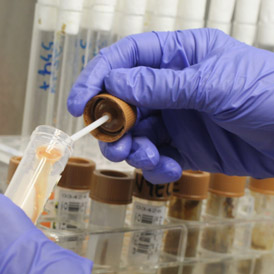Scientists hunt E.coli outbreak source
As scientists work to identify the source of the E.coli outbreak, a public health expert tells Channel 4 News that washing salads thoroughly remains the best way to avoid infection.
The spread of the illness was originally blamed on cucumbers and other fresh vegetables, but scientists have now said they are unsure of the origins of the outbreak, which has killed at least 18 people and infected over 1,700 worldwide.
It is Europe’s worst recorded food-poisoning incident and in the last few days has spread to a further three countries – the Czech Republic, France and the United States. Germany, Austria, Denmark, the Netherlands, Spain, Sweden, Switzerland and the UK have already reported incidents of the illness.
Around 200 new cases have been reported in the last two days alone, health officials said.

All cases except one have been discovered in people from northern Germany, people who have recently visited the area or, in one case, a person who has had contact with a recent visitor. Seven people have been affected in the UK, all of whom caught the infection in Germany. A Government spokesman said Chancellor Angela Merkel was setting up an E.coli task force to deal with the situation.
Researchers suspect that salad could still be the source of the rare, possibly unique form of the bacteria – particularly raw tomatoes, cucumbers and lettuce – but have been unable to pinpoint the exact food responsible.
The World Health Organisation (WHO) said it was conducting “numerous investigations” but the source remained unknown.
E.coli brings EU veg trade to 'standstill'
How to avoid infection
The salad imports market in Europe is complex, with the origin of the goods often difficult to ascertain. As such, a public health expert told Channel 4 News that a “better to be safe than sorry” attitude was wise for people in the UK – but avoiding salad altogether would be an overreaction.
I’ll be frank, I’m not going to stop eating lettuce. But just make sure it is washed properly. Paul Hunter, health expert
Paul Hunter, Clinical Professor at the University of East Anglia, told Channel 4 News: “I’ll be frank, I’m not going to stop eating lettuce. Salads are a good thing to eat, they’re healthy. But just make sure it is washed properly.
“I was involved in an investigation into a big salad outbreak with lettuce just over 10 years ago in the UK and the people who got sick were those who tended to eat salad that was not properly washed – such as fast food outlets which did not wash salad properly at the time.
“Since then I’ve repeatedly extolled the virtues of washing lettuce properly and that’s the most important thing people can do. It’s not an absolute certainty, but I think it reduces the risk to what many people would say are tolerable levels.”

Seven people in UK affected
Seven people in the UK have been affected by the outbreak, including three Britons and four German nationals. The Health Protection Agency said all UK cases caught the infection in Germany, where the infections began.
The number of cases has continued to rise in Germany in recent days. Fifteen people have died of the illness in Germany, and one in Sweden. There are unconfirmed reports of at least two more deaths in Germany, and many more patients are in hospital.
The Health Protection Agency (HPA) in the UK warned people travelling to Germany to avoid eating raw tomatoes, cucumbers and leafy salad while experts try to isolate the source. There have been no reported cases of the disease originating in the UK yet.
Other countries have gone further in a bid to stop the disease spreading. Russia has extended its ban on vegetables to the entire European Union – which officials say is disproportionate. The Spanish Prime Minister has demanded an explanation from Germany for suggesting Spanish produce was a possible source of the illness.
The HPA has urged anyone returning from Germany with an illness to seek medical attention.
The outbreak is already the third largest outbreak in recent history, and may be the deadliest. Twelve people died in a 1996 Japanese outbreak that reportedly sickened more than 9,000, and seven died in a Canadian outbreak in 2000.